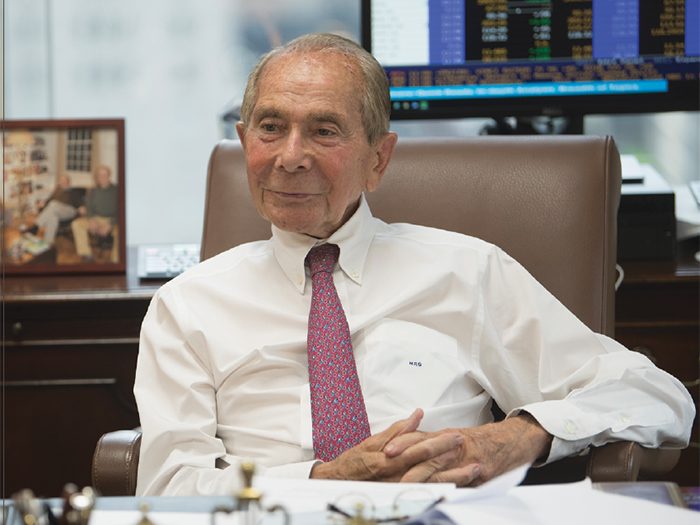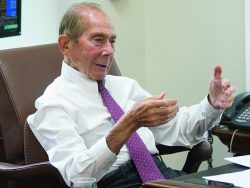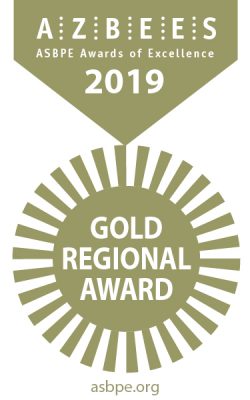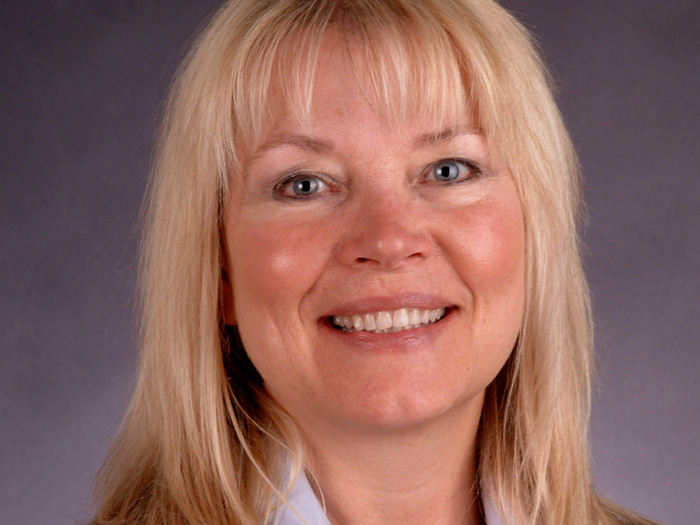Exclusive | Hank Greenberg on China Trade, Starr’s Rapid Growth and 100th, Spitzer, Schneiderman and More

In 1960, Maurice “Hank” Greenberg was hired as a vice president of C.V. Starr & Co. At age 35, he had already accomplished a great deal.
He served his country as part of the Allied Forces that stormed the beaches at Normandy and liberated the Nazi death camps. He fought again during the Korean War, earning a Bronze Star. He held a law degree from New York Law School.
Now he was ready to make his mark on the business world.
Even C.V. Starr himself — who hired Mr. Greenberg and later hand-picked him as the successor to the company he founded in Shanghai in 1919 — could not have imagined what a mark it would be.
Mr. Greenberg began to build AIG as a Starr subsidiary, then in 1969, he took it public. The company would, at its peak, achieve a market cap of some $180 billion and cement its place as the largest insurance and financial services company in history.
This month, Mr. Greenberg travels to China to celebrate the 100th anniversary of C.V. Starr & Co. That visit occurs at a prickly time in U.S.-Sino relations, as the Trump administration levies tariffs on hundreds of billions of dollars in Chinese goods and China retaliates.
In September, Risk & Insurance® sat down with Mr. Greenberg in his Park Avenue office to hear his thoughts on the centennial of C.V. Starr, the dynamics of U.S. trade relationships with China and the future of the U.S. insurance industry as it faces the challenges of technology development and talent recruitment and retention, among many others. What follows is an edited transcript of that discussion.
R&I: One hundred years is quite an impressive milestone for any company. Celebrating the anniversary in China signifies the importance and longevity of that relationship. Can you tell us more about C.V. Starr’s history with China?

Hank Greenberg: We have a long history in China. I first went there in 1975. There was little there, but I had business throughout Asia, and I stopped there all the time. I’d stop there a couple of times a year and build relationships.
When I first started visiting China, there was only one state-owned insurance company there, PICC (the People’s Insurance Company of China); it was tiny at the time. We helped them to grow.
I also received the first foreign life insurance license in China, for AIA (The American International Assurance Co.). To date, there has been no other foreign life insurance company in China. It took me 20 years of hard work to get that license.
“It turns out that it is harder [for China] to change, because they have one leader. My guess is that we’ll work it out sooner or later. Trump and Xi have to meet. That will result in some agreement that will get to them and they will have to finish the rest of the negotiations. I believe that will happen.” — Maurice “Hank” Greenberg, chairman and CEO, C.V. Starr & Co. Inc.
We also introduced an agency system in China. They had none. Their life company employees would get a salary whether they sold something or not. With the agency system of course you get paid a commission if you sell something. Once that agency system was installed, it went on to create more than a million jobs.
R&I: So Starr’s success has meant success for the Chinese insurance industry as well.
Hank Greenberg: That’s partly why we’re going to be celebrating that anniversary there next month. That celebration will occur alongside that of IBLAC (International Business Leaders’ Advisory Council), an international business advisory group that was put together when Zhu Rongji was the mayor of Shanghai [Zhu is since retired from public life]. He asked me to start that to attract foreign companies to invest in Shanghai.
Shanghai and China in general were just coming out of the doldrums then; there was a lack of foreign investment. Zhu asked me to chair IBLAC and to help get it started, which I did. I served as chairman of that group for a couple of terms. I am still a part of that board, and it will be celebrating its 30th anniversary along with our 100th anniversary.
We have a good relationship with China, and we’re candid as you can tell from the op-ed I published in the Wall Street Journal. I’m told that my op-ed was received quite well in China, by both Chinese companies and foreign companies doing business there.
On August 29, Mr. Greenberg published an opinion piece in the WSJ reminding Chinese leaders of the productive history of U.S.-Sino relations and suggesting that Chinese leaders take pragmatic steps to ease trade tensions with the U.S.
R&I: What’s your outlook on current trade relations between the U.S. and China?
Hank Greenberg: As to the current environment, when you are in negotiations, every leader negotiates differently.
President Trump is negotiating based on his well-known approach. What’s different now is that President Xi (Jinping, General Secretary of the Communist Party of China) made himself the emperor. All the past presidents in China before the revolution had two terms. He’s there for life, which makes things much more difficult.
R&I: Sure does. You’ve got a one- or two-term president talking to somebody who can wait it out. It’s definitely unique.
Hank Greenberg: So, clearly a lot of change is going on in China. Some of it is good. But as I said in the op-ed, China needs to be treated like the second largest economy in the world, which it is. And it will be the number one economy in the world in not too many years. That means that you can’t use the same terms of trade that you did 25 or 30 years ago.
They want to have access to our market and other markets. Fine, but you have to have reciprocity, and they have not been very good at that.
R&I: What stands in the way of that happening?
Hank Greenberg: I think there are several substantial challenges. One, their structure makes it very difficult. They have a senior official, a regulator, who runs a division within the government for insurance. He keeps that job as long as he does what leadership wants him to do. He may not be sure what they want him to do.
For example, the president made a speech many months ago saying they are going to open up banking, insurance and a couple of additional sectors to foreign investment; nothing happened.
The reason was that the head of that division got changed. A new administrator came in who was not sure what the president wanted so he did nothing. Time went on and the international community said, “Wait a minute, you promised that you were going to do that and you didn’t do that.”
So the structure is such that it is very difficult. China can’t react as fast as it should. That will change, but it is going to take time.
R&I: That’s interesting, because during the financial crisis in 2008 there was talk that China, given their more centralized authority, could react more quickly, not less quickly.
Hank Greenberg: It turns out that it is harder to change, because they have one leader. My guess is that we’ll work it out sooner or later. Trump and Xi have to meet. That will result in some agreement that will get to them and they will have to finish the rest of the negotiations. I believe that will happen.
R&I: Obviously, you have a very unique perspective and experience in China. For American companies coming to China, what are some of the current challenges?
Hank Greenberg: Well, they very much want to do business in China. That’s due to the sheer size of the country, at 1.4 billion people. It’s a very big market and not just for insurance companies. It’s a whole range of companies that would like to have access to China as easily as Chinese companies have access to the United States. As I said previously, that has to be resolved.
It’s not going to be easy, because China has a history of not being treated well by other countries. The U.S. has been pretty good in that way. We haven’t taken advantage of China.
R&I: Your op-ed was very enlightening on that topic.
Hank Greenberg: President Xi wants to rebuild the “middle kingdom,” to what China was, a great country. Part of that was his takeover of the South China Sea rock islands during the Obama Administration; we did nothing. It’s a little late now to try and do something. They promised they would never militarize those islands. Then they did. That’s a real problem in Southern Asia. The other countries in that region are not happy about that.
R&I: One thing that has differentiated your company is that it is not a public company, and it is not a mutual company. We think you’re the only large insurance company with that structure at that scale. What advantages does that give you?
Hank Greenberg: Two things. First of all, we’re more than an insurance company. We have the traditional investment unit with the insurance company. Then we have a separate investment unit that we started, which is very successful. So we have a source of income that is diverse. We don’t have to underwrite business that is going to lose a lot of money. Not knowingly anyway.
R&I: And that’s because you are a private company?
Hank Greenberg: Yes. We attract a different type of person in a private company.
R&I: Do you think that enables you to react more quickly?
Hank Greenberg: Absolutely. When we left AIG there were three of us. Myself, Howie Smith and Ed Matthews. Howie used to run the internal financials and Ed Matthews was the investment guy coming out of Morgan Stanley when I was putting AIG together. We started with three people and now we have 3,500 and growing.
“I think technology can play a role in reducing operating expenses. In the last 70 years, you have seen the expense ratio of the industry rise, and I’m not sure the industry can afford a 35 percent expense ratio. But while technology can help, some additional fundamental changes will also be required.” — Maurice “Hank” Greenberg, chairman and CEO, C.V. Starr & Co. Inc.
R&I: You being forced to leave AIG in 2005 really was an injustice, by the way. AIG wouldn’t have been in the position it was in 2008 if you had still been there.
Hank Greenberg: Absolutely not. We had all the right things in place. We met with the financial services division once a day every day to make sure they stuck to what they were supposed to do. Even Hank Paulson, the Secretary of Treasury, sat on the stand during my trial and said that if I’d been at the company, it would not have imploded the way it did.
R&I: And that fateful decision the AIG board made really affected the course of the country.
Hank Greenberg: So many people lost all of their net worth. The new management was taking on billions of dollars’ worth of risk with no collateral. They had decimated the internal risk management controls. And the government takeover of the company when the financial crisis blew up was grossly unfair.
From the time it went public, AIG’s value had increased from $300 million to $180 billion. Thanks to Eliot Spitzer, it’s now worth a fraction of that. His was a gross misuse of the Martin Act. It gives the Attorney General the power to investigate without probable cause and bring fraud charges without having to prove intent. Only in New York does the law grant the AG that much power.
R&I: It’s especially frustrating when you consider the quality of his own character, and the scandal he was involved in.
In early 2008, Spitzer was caught on a federal wiretap arranging a meeting with a prostitute at a Washington Hotel and resigned shortly thereafter.
Hank Greenberg: Yes. And it’s been successive. Look at Eric Schneiderman. He resigned earlier this year when it came out that he had abused several women. And this was after he came out so strongly against other men accused of the same thing. To me it demonstrates hypocrisy and abuse of power.
Schneiderman followed in Spitzer’s footsteps in leveraging the Martin Act against numerous corporations to generate multi-billion dollar settlements.
R&I: Starr, however, continues to thrive. You said you’re at 3,500 people and still growing. As you continue to expand, how do you deal with the challenge of attracting talent?
Hank Greenberg: We did something last week.
On September 16th, St. John’s University announced the largest gift in its 148-year history. The Starr Foundation donated $15 million to the school, establishing the Maurice R. Greenberg Leadership Initiative at St. John’s School of Risk Management, Insurance and Actuarial Science.
Hank Greenberg: We have recruited from St. John’s for many, many years. These are young people who want to be in the insurance industry. They don’t get into it by accident. They study to become proficient in this and we have recruited some very qualified individuals from that school. But we also recruit from many other universities. On the investment side, outside of the insurance industry, we also recruit from Wall Street.
R&I: We’re very interested in how you and other leaders in this industry view technology and how they’re going to use it.
Hank Greenberg: I think technology can play a role in reducing operating expenses. In the last 70 years, you have seen the expense ratio of the industry rise, and I’m not sure the industry can afford a 35 percent expense ratio. But while technology can help, some additional fundamental changes will also be required.
R&I: So as the pre-eminent leader of the insurance industry, what do you see in terms of where insurance is now and where it’s going?
Hank Greenberg: The country and the world will always need insurance. That doesn’t mean that what we have today is what we’re going to have 25 years from now.
How quickly the change comes and how far it will go will depend on individual companies and individual countries. Some will be more brave than others. But change will take place, there is no doubt about it.
More will go on in space, there is no question about that. We’re involved in it right now as an insurance company, and it will get broader.
One of the things you have to worry about is it’s now a nuclear world. It’s a more dangerous world. And again, we have to find some way to deal with that.
So, change is inevitable. You need people who can deal with change.
R&I: Is there anything else, Mr. Greenberg, you want to comment on?
Hank Greenberg: I think I’ve covered it. &











